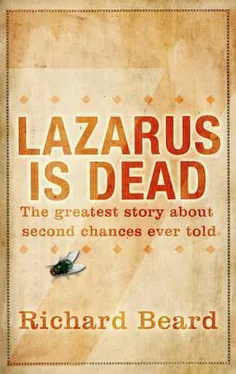Cassius resists such intuitive umbrage, the equivalent of assuming that Lazarus smells. True and false are such primitive categories. He prefers to ask whether the raising of Lazarus can be useful.
In Bethany, a blue-eyed Bedouin lost in the crowd, Cassius had watched Jesus weep. Angry, uncomfortable, Jesus had called Lazarus out from his tomb. The incident had been compellingly staged.
Cassius will admit that Lazarus emerging from the darkness of the tomb, flapping and falling in his funeral rags, had been an unsettling spectacle. Not what he or anyone else had expected. It was unbelievable. He had flung his gourd of water to the ground, put his hands on his hips. This should not be allowed, not after he’d sent his briefing to Rome. He’d confirmed in writing that Lazarus was dead, and claimed this as convincing proof of the weakness of Jesus. In Judaea, he reported, there was currently no identifiable threat.
He has now had a day and a half to subdue his indignation, to rationalise what he’s seen and not to believe his eyes.
Cassius is no stranger to the divine. As a junior officer he’d once stood within twenty paces of the Emperor Tiberius in Rome. He will never come closer to a god on earth, but with the emperor it is easy to tell. He shines. He gives off light.
On this occasion Cassius has decided to be philosophical, in the manner of Cicero: ‘For nothing can happen without cause; nothing happens that cannot happen, and when what was capable of happening has happened, it may not be interpreted as a miracle … We therefore draw the conclusion: what was incapable of happening never happened, and what was capable of happening is not a miracle’ ( De Divinatione 2: 28, 44 BCE).
Cassius is culturally in sympathy with Cicero’s Roman approach: Lazarus may well have come back from the dead. Fine. Absorbed. One day Rome will discover how and why, even if in every time and place until that day the event will remain a mystery.
To kill him as the Sanhedrin wish to do is a wasted opportunity.
‘I asked you to take off your clothes. I suggest you cooperate.’
What is worse than death?
Lazarus being sent to Rome as a trophy. This is the standard imperial response to awkward religious figures. Humiliate the shaman. Lock him in a travelling cage, and parade him naked to Rome.
In the Forum the senators will titter behind their hands at the Jew back from the dead. They will keep him in reserve for an afternoon of applied theology at the Circus — god’s chosen cadet against god’s unblessed beasts. A dilemma to intrigue Caesar himself, if Lazarus is lucky.
But first the senators will ask him what is beyond.
If he fails to answer they will tire of him. Then they will torture him, to ensure he tells the truth. Reason permits deceit, and pain suppresses reason. Lazarus will not lie if his rational faculties are inhibited.
It is a simple question, Lazarus — tell us what is beyond.
They start with the flogging whip, or flagellum , made with straps of leather embedded with glass or nails. If this doesn’t kill him, the torture can progress to more intricate equipment like the equuleus , the ‘young horse’. Iron weights are involved, and a narrow customised bench.
In his Lives of the Twelve Caesars (119 CE) the historian Suetonius describes a first-century torture invented by Tiberius (14–37 CE), the emperor at this time. Tiberius would force his victims ‘to drink a great quantity of wine, and presently tie their members with a lute string, that he might rack them at once with the girding of the string, and with the pressure of urine’.
Tiberius will be succeeded by Caligula, notorious for his use of flames and saws. It is at this stage that prisoners call for their mothers, then after that for their god.
If Lazarus insists on remaining silent, refusing even under torture to share his experience of the beyond, the Romans will wash their hands and crucify him.
The agony will be worse than any illness. It may be worse than death.
Nothing can surprise Lazarus, not now. This is how he keeps himself calm. He reminds himself that anything can happen, good or bad. In which case, has he learned more than anyone else?
He is lying face-down on the floor, naked, his arms and legs spread in a star. Mosaic squares stipple his belly when he breathes. The doctor, a Greek with a long face, is examining the skin behind his ears.
‘Turn over. Lie on your back.’
The doctor inspects Lazarus’s gums, then thumbs up his eyelids.
‘There’s no smell, is there?’ Cassius is leaning against a wall with his arms crossed.
‘Mosquito bite. Inside of the left knee.’
‘Is that significant?’
‘He’s not invulnerable. And look at his breathing. Like you and me he has to get air to his stomach. His liver has to move blood around the body.’
‘Can he feel pain?’
The doctor pinches his ear, hard. Lazarus jerks away, covering his head. Cassius kicks him his clothes.
‘The worst is over,’ he says. He dismisses the doctor but not the guards at the door. ‘Sit down, Lazarus. Eat an apple.’
While Lazarus dresses, Cassius taps the pads of his fingers against his lower lip, fleshing it out. ‘I have one more question.’
They sit opposite each other. Lazarus takes an apple and bites into it. His gums aren’t perfect — he leaves an imprint of blood on the exposed white flesh.
‘You want to ask what is beyond, don’t you?’
‘No. I want to ask if your god makes mistakes. Roman gods get it wrong all the time.’
The gods Cassius has known since childhood are imperfect, omniscient but not all powerful — they give fire to the titans and the titans are tricked by men. Jupiter shrugs his shoulders. Life goes on.
‘Earlier today Jesus arrived in Jerusalem on a donkey, as prophesied in the Book of Zechariah. I’m a foreigner and even I know that. There are other scriptures predicting a messiah from the line of David who comes from Nazareth. A star will shine brightly above his birthplace in Bethlehem.’
Lazarus reaches for a second apple. They’d studied the verses about the donkey back in Nazareth, and Jesus knows his scriptures.
‘Was there or was there not a star over Bethlehem when you were born?’
‘There was a star over every baby born in the village at that time.’
‘Yes,’ Cassius says. ‘But all of them except you and Jesus are dead. You too came into Jerusalem on a donkey, when you went to the Bethesda pool.’
Lazarus swallows his mouthful of apple. ‘I’m the son of a mason from Galilee. I was born in Bethlehem and fled with my family into Egypt.’
‘Exactly. You’re everything the scriptures said you would be.’ Cassius scratches the skin at the side of his eye. ‘And doesn’t the messiah come back from the dead?’
4
Everything is about Jesus these days, and has been for two thousand years.
It is Sunday night, one day after the resurrection of Lazarus, at the start of what has come to be known as Holy Week. During the next seven days Jesus will preach and make promises. He will eventually get himself arrested, tried, crucified and buried, and on the third day he will rise again to judge the quick and the dead.
Lazarus is a precondition for all these events, because the raising of Lazarus inspires the believers who accompany the triumphal entry into Jerusalem. This in turn explains why neither the Sanhedrin nor the Romans can take immediate action against Jesus — ‘yet they could not find any way to do it, because all the people hung on his words’ (Luke 19: 48). Without Lazarus, Jesus would never have lasted until Friday.
As it is, his exact movements between now and then are disputed. For several days Jesus circulates freely while nothing is heard of his friend. The dramatic events towards the end of the week, starting with Thursday night’s arrest in the Garden of Gethsemane, tend to eclipse the days that come before.
Читать дальше












